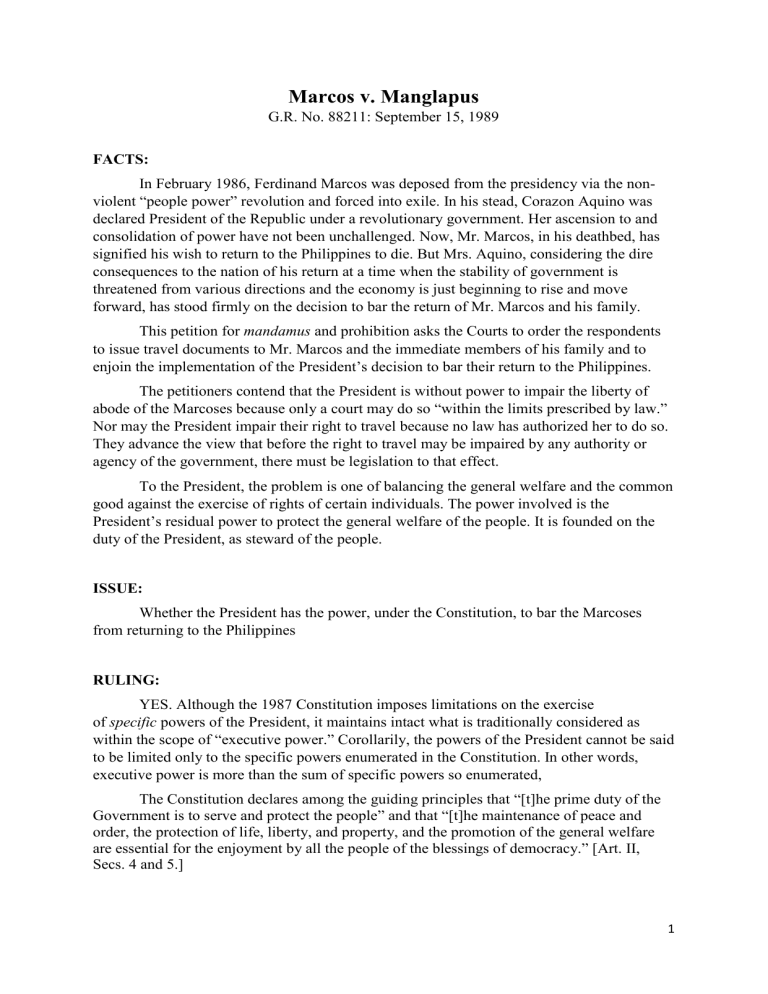
Marcos v. Manglapus G.R. No. 88211: September 15, 1989 FACTS: In February 1986, Ferdinand Marcos was deposed from the presidency via the nonviolent “people power” revolution and forced into exile. In his stead, Corazon Aquino was declared President of the Republic under a revolutionary government. Her ascension to and consolidation of power have not been unchallenged. Now, Mr. Marcos, in his deathbed, has signified his wish to return to the Philippines to die. But Mrs. Aquino, considering the dire consequences to the nation of his return at a time when the stability of government is threatened from various directions and the economy is just beginning to rise and move forward, has stood firmly on the decision to bar the return of Mr. Marcos and his family. This petition for mandamus and prohibition asks the Courts to order the respondents to issue travel documents to Mr. Marcos and the immediate members of his family and to enjoin the implementation of the President’s decision to bar their return to the Philippines. The petitioners contend that the President is without power to impair the liberty of abode of the Marcoses because only a court may do so “within the limits prescribed by law.” Nor may the President impair their right to travel because no law has authorized her to do so. They advance the view that before the right to travel may be impaired by any authority or agency of the government, there must be legislation to that effect. To the President, the problem is one of balancing the general welfare and the common good against the exercise of rights of certain individuals. The power involved is the President’s residual power to protect the general welfare of the people. It is founded on the duty of the President, as steward of the people. ISSUE: Whether the President has the power, under the Constitution, to bar the Marcoses from returning to the Philippines RULING: YES. Although the 1987 Constitution imposes limitations on the exercise of specific powers of the President, it maintains intact what is traditionally considered as within the scope of “executive power.” Corollarily, the powers of the President cannot be said to be limited only to the specific powers enumerated in the Constitution. In other words, executive power is more than the sum of specific powers so enumerated, The Constitution declares among the guiding principles that “[t]he prime duty of the Government is to serve and protect the people” and that “[t]he maintenance of peace and order, the protection of life, liberty, and property, and the promotion of the general welfare are essential for the enjoyment by all the people of the blessings of democracy.” [Art. II, Secs. 4 and 5.] 1 Admittedly, service and protection of the people, the maintenance of peace and order, the protection of life, liberty and property, and the promotion of the general welfare are essentially ideals to guide governmental action. But such does not mean that they are empty words. Thus, in the exercise of presidential functions, in drawing a plan of government, and in directing implementing action for these plans, or from another point of view, in making any decision as President of the Republic, the President has to consider these principles, among other things, and adhere to them. Faced with the problem of whether or not the time is right to allow the Marcoses to return to the Philippines, the President is, under the Constitution, constrained to consider these basic principles in arriving at a decision. More than that, having sworn to defend and uphold the Constitution, the President has the obligation under the Constitution to protect the people, promote their welfare and advance the national interest. It must be borne in mind that the Constitution, aside from being an allocation of power is also a social contract whereby the people have surrendered their sovereign powers to the State for the common good. Hence, lest the officers of the Government exercising the powers delegated by the people forget and the servants of the people become rulers, the Constitution reminds everyone that “[s]overeignty resides in the people and all government authority emanates from them.” [Art. II, Sec. 1.] The request or demand of the Marcoses to be allowed to return to the Philippines cannot be considered in the light solely of the constitutional provisions guaranteeing liberty of abode and the right to travel, subject to certain exceptions, or of case law which clearly never contemplated situations even remotely similar to the present one. It must be treated as a matter that is appropriately addressed to those residual unstated powers of the President which are implicit in and correlative to the paramount duty residing in that office to safeguard and protect general welfare. In that context, such request or demand should submit to the exercise of a broader discretion on the part of the President to determine whether it must be granted or denied. The President has determined that the destabilization caused by the return of the Marcoses would wipe away the gains achieved during the past few years and lead to total economic collapse. 2









